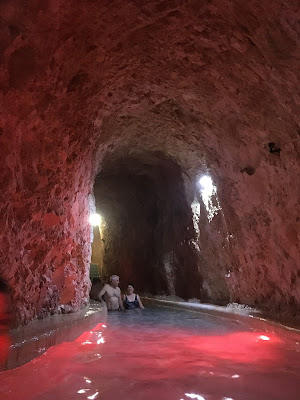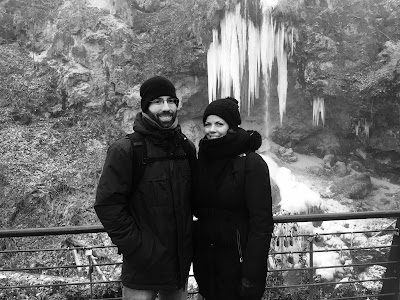 |
| Good seats for the face-off |
On the other hand, you’re in Europe. Everything is in German. Fans sing soccer-esque chants you don't know. And there is mulled wine and several varieties of sausage served at the concession.
These two sensations competed with each other when we watched the Dusseldorf EG host the Iserlohn Roosters.
The old school hockey fans in Canada might cry foul about the Europeans game and its lack of fights and blood and missing teeth. Do not be deterred, the game here is great to watch.
While Canadians like to think that hockey is their game, and that they play it the best, there is good hockey elsewhere too. In Germany, it’s fast and exciting: The final score was 5-4 for the Dorf.
While Canadians like to think that hockey is their game, and that they play it the best, there is good hockey elsewhere too. In Germany, it’s fast and exciting: The final score was 5-4 for the Dorf.
The league’s players are career players – some have played in the NHL or one of the other minor leagues, so they bring just enough skill to make the game look good but are able to make the odd error that can turn around a play and make your pulse race.
It’s also not as nearly as physical as the North American game – even if both teams have a healthy contingent of Canadian players on their rosters. The game is fast, focusing on skating and passing, with few stoppages and plenty of back and forth hockey.
Germany might be a soccer country, but a country of 80 million people also has its niche sports, like hockey, whose fans will not sit silently in its niche.
And this is the beauty of going to niche sporting event: the fans. There are not a lot of German hockey fans, but the ones that show up are serious. They’re wrapped in their team scarves, wearing jerseys and toques, and bejewelled with countless pins.
We had seats just a row over from the Roosters’ booster section, which was full of blue-and-white-clad fans who made the drive to the Dorf from Iserlohn. They were on their feet most of the game, singing, chanting, and cheering.
 |
| Those rowdy Rooster fans. |
The hockey fandom in Germany seems to be at the grassroots. Most of the boxes in the arena were empty. Hockey here is truly relies on the fans, and not big money or cTV contract dollars or corporate sponsorships. Soccer teams in Dortmund or Cologne attract the big money here, but of course with that comes the casual fans.
In this way a German hockey game feels more like a minor league game.
The NHL hockey game is great, awe-inspiring, featuring the best players in the world. It's also remote, distant, and, in cities like Toronto, dispassionate. The cost is also high, so most fans like me watch it from the couch at home.
The minor league hockey game is different. Sure, it doesn't have the monumentality of a pro game, but it's intimate and accessible. This was the hockey I grew up watching live like my hometown's London Knights and later my university's team, and later, in Toronto, the Marlies.
These smaller arenas were full of families, students, fans, and people who don’t leave at the second intermission to beat traffic. And while the passion that draws Canadians to watch every level of competitive hockey seems unique to us, it's not – that hockey passion is in other places as well (for example, I worked with a Hungarian hockey fan in Budapest).
The NHL hockey game is great, awe-inspiring, featuring the best players in the world. It's also remote, distant, and, in cities like Toronto, dispassionate. The cost is also high, so most fans like me watch it from the couch at home.
The minor league hockey game is different. Sure, it doesn't have the monumentality of a pro game, but it's intimate and accessible. This was the hockey I grew up watching live like my hometown's London Knights and later my university's team, and later, in Toronto, the Marlies.
These smaller arenas were full of families, students, fans, and people who don’t leave at the second intermission to beat traffic. And while the passion that draws Canadians to watch every level of competitive hockey seems unique to us, it's not – that hockey passion is in other places as well (for example, I worked with a Hungarian hockey fan in Budapest).
In Germany, you go to a Dusseldorf EG because you love the team or the sport, so the enthusiasm is electric in a place like this. That passion is also likely more powerful because you're a hockey fan in a soccer country, so you might as be passionate and a little eccentric.
There’s not a lot of things I miss from home, mostly stuff that can't be bought: Family, friends, the comfort of familiar surroundings. But there are some small comforts that help assuage the homesickness for a little while. Hockey, as niche as it might be in Germany or Hungary or anywhere, is one of those things.
 |
| Mulled wine and hockey. Mmmmmmm.... |






